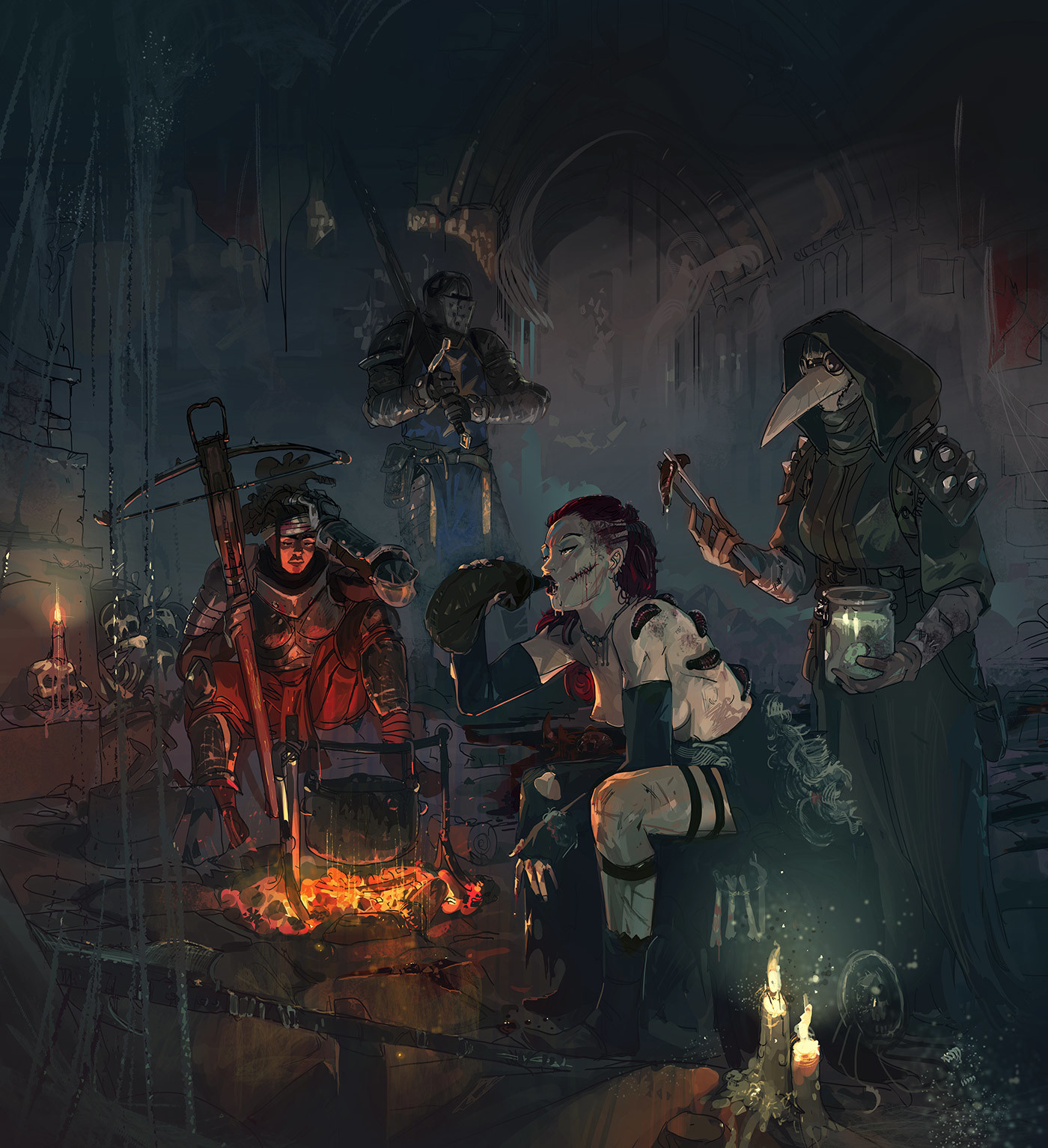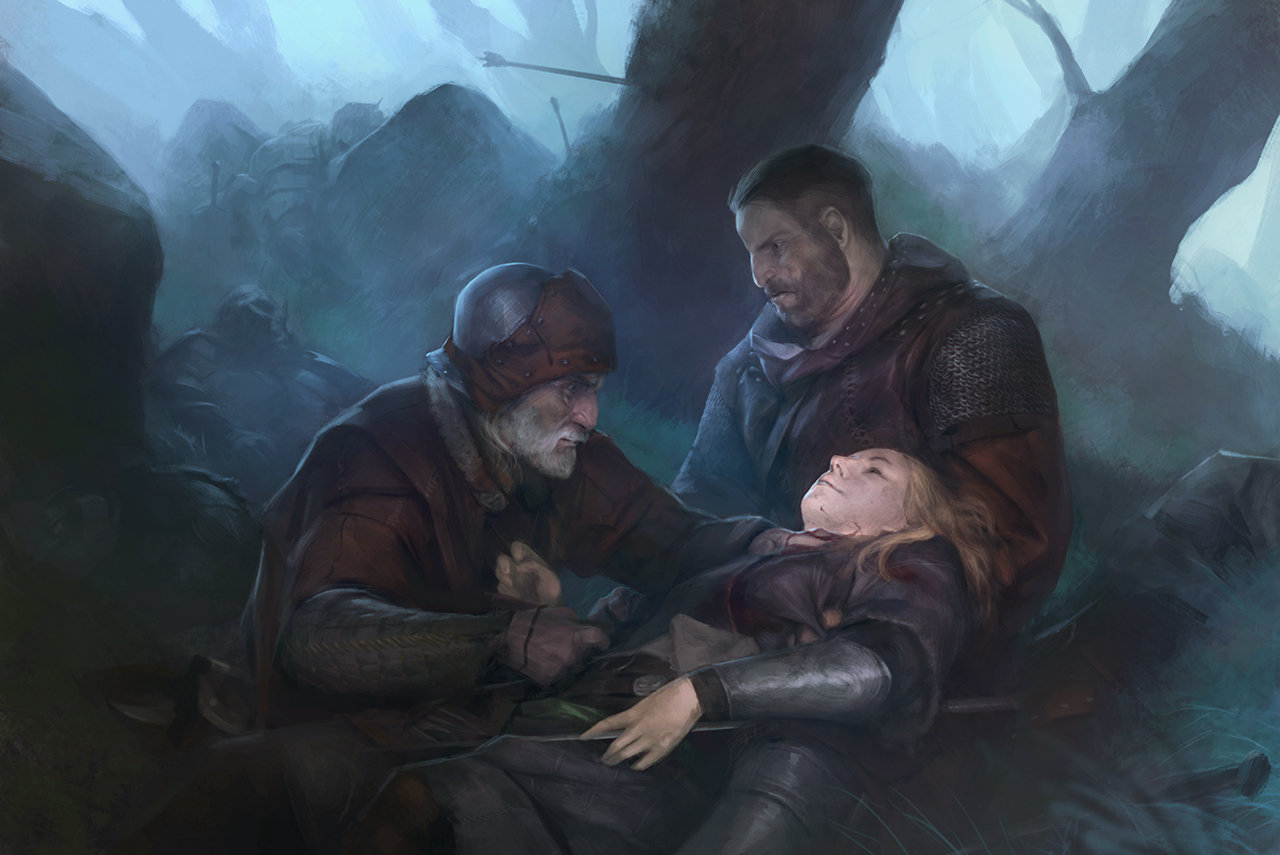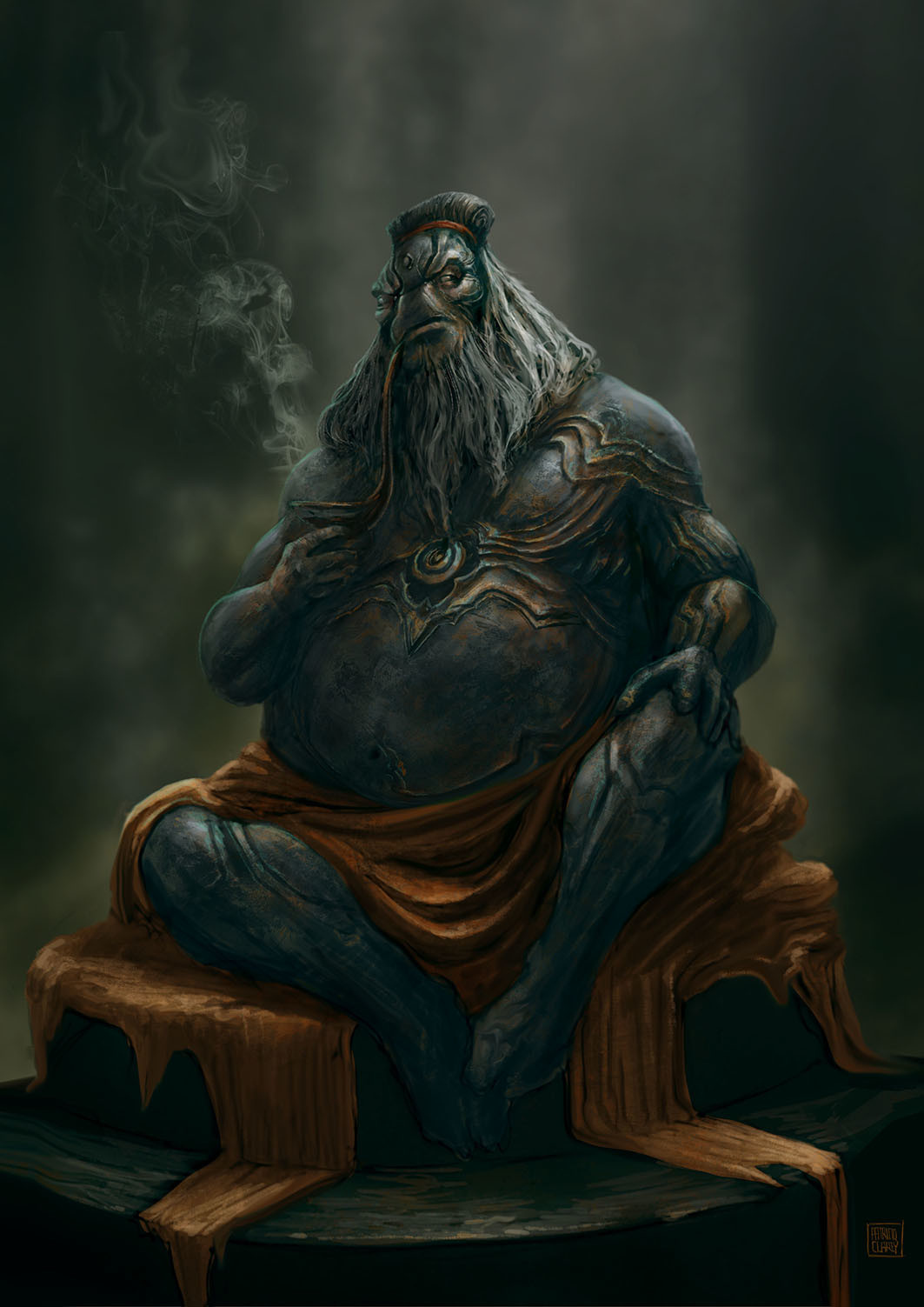With further thanks to
James Young for several of these entries.
So you made it out of whatever godsforsaken tomb you delved into, and you even have something shiny to show for it! You high-tail it back to the markets of the Yellow City to pawn off your ill-gotten gains and then... Well you're stuck here for the next month, you'd better find something to do.
When you return to civilisation, follow these steps:
- Cash in your treasure and decide how much of your debt to pay off (if any).
- Divide up the remaining treasure for XP purposes - 1 silver ring = 1 XP.
- Hold funerals for fallen companions - you can trade in their XP for silver rings spent on the funeral(s).
- Determine your lifestyle costs for this month.
- Go shopping! You can buy equipment, hire retainers and recruit hirelings in this step.
- Choose up to 2 downtime activities, as detailed below. Crab-men have a special set of options, decided upon by their master.
- Level up, if you can
Additional downtime activities may become available to you depending on how your characters progress.
Regular Downtime Activities
Carouse
You hit the town hard. Your indulge yourself with hedonistic indulgence in opium, tea, rice liquor, whores, and gambling. In mechanical terms you pay up an amount of silver and immediately gain that amount of XP. Your life of excess can have consequences, roll 1d10:
- On a roll of 1 you become addicted to opium (roll again, 1-2 indicates a rare type).
- On a roll of 2 your profligate spending lands you further in debt - roll 2d6 and add the total to the party's debt in gold rings.
- On a roll of 9 you remember a story or rumour regarding a nearby location told during a night of unspeakable excess.
- On a roll of 10 you immediately recruit a hireling - they're in this more for a laugh than anything and will only expect a quarter-share of treasure in the next session's adventure. They'll want more after that, of course.
Bank
Limited to Social Rank 6 or above. You deposit an amount of silver rings into an account run by a reputable and stable moneylender or oligopolist clan. This pays out a guaranteed 2% each month. You can nominate a successor to inherit your wealth if the worst happens, but a death tax of 10% applies your savings. If your Social Rank drops below 6 then your money is quietly returned to you and your account closed.
Invest
As per the
Lamentations of the Flame Princess core rulebook. You invest a sum of money in a business venture hoping for a good return, paid out annually. You choose whether the investment if Stable, Risky, or Wild:
- A Stable investment grows by 1d8-4% per year.
- A Risky investment grows by 1d20-10% per year.
- A Wild investment grows by 1d100-50% per year.
Add 10% to the above if you have an accountant managing the investment for you. If the final growth is positive you receive that amount to do with as you please. If the growth is negative you get nothing and the value of the investment decreases. The yearly return amounts 'explode' (positively and negatively) - if you roll the maximum on your investment die, roll again and add this to the total. If you again roll the maximum, make another roll, and so on. Do this for the minimum roll as well, and subtract that number from the return.
If you wish to withdraw your investment, you can only do so freely at the time of the yearly return. Otherwise a penalty of -1d6+4% is applied to the sum returned.
There is also a chance that any investment will go
Bankrupt! during a given year and your investment vanishes:
- Stable: 5%
- Risky: 10%
- Wild: 25%
Magical Research
Magicians and slug-men can devote time to arcane research in an attempt to research new spells. Holy-men can meditate and pray on divine mysteries to expand their portfolio of divine invocations. The process for each of these is identical - you pay 100 silver rings to cover the costs of your alchemical materials/divine incense etc. and roll for a new spell/invocation. You can pay in multiples of 100 to reroll the result, but you must specify this beforehand and all payments are final - you don't get a refund for unused rerolls.
To make a magic item you must pay 1d6gp to purchase commonly available reagents.
You must use materials that are soaked in magical, spiritual or
otherwise otherworldly energy when creating something magical. For
example - regular parchment can't hold the magical energy needed to make a magic
scroll but the ritually tattooed and tanned skin of a prince, a strip of cloth from a fakir's robe, or a spell
etched into the scale of a dragon definitely could. Likewise a regular
length of wood is entirely unsuited for use as a magic vessel, but the
finger of a treant, or the petals of a lily that grows in a magic spring
would be perfect for a vessel or potion base, respectively.
Inscriptions are one-use instances of a spell - when they are cast the
inscription crumbles
to ash and adds an extra level of the appropriate class to the spell
effects. Thus, scrolls can be cast by anyone (even non-spellcasters) if
they have been identified and are legible.
Potions distil the essence of a spell into liquid form. It takes
an action to drink a potion and the effects take place immediately. Like
inscriptions,
potions provide one appropriate level to
the effects. The nature of the spell will usually make the effect of the
potion obvious, but if not then consult me.
Vessels are a physical containers for spells, i.e. a magic wands or staves. A
vessel has an
integrity rating
based on how long the base material was exposed to magic - 1d100 years
exposed for an organic material, decades for an inorganic one. Imbuing a
spell into a
vessel decreases its
integrity by 2d10 years/decades. When creating the
vessel you
must confirm how many of your levels you are investing into it. Your
powers are then stripped from you for an equivalent number of weeks. The
vessel has this many levels that can be used to cast the spell
contained within, and you can add your own levels on top of this. When
you attempt to use the
vessel you must roll under its
integrity on a d100, adding 10 to your roll for each of your own levels that you added. A successful
Arcana
check reduces the result by 10 for each margin of success, to a minimum
of 10 (1). Success means that the spell casts as normal, failure means
the vessel loses d100
integrity and you suffer a
Arcane Cascade or
Thaumaturgic Revelation. If a vessel is reduced to 0
integrity it is destroyed in an explosion of barely constrained chaos.
Legwork
You frequent the tea houses, opium dens and marketplaces of the movers and shakers in the Yellow City, hunting for something juicy and a way up the well-greased pole of Yellow City social life. Roll on the table below (1d10):
- Your questions and obvious obsequiousness ruffle the wrong feathers. You are cornered in an alley, beaten, and robbed of 1d50% of your wealth.
- All in vain - the tea houses are closed to you, the opium fiends shun you, and your contacts pretend like you don't exist.
- You hear some interesting rumours about a location, known or unknown. It might be nearby or in the far reaches of the Purple Land, but the rumours are guaranteed to be useful.
- You drink and smoke with some explorers from (1d3) 1. Lahag, 2. Lamarakh, 3. Sughd. They impart some useful wisdom regarding the various threats and terrors of their lands.
- You strike up a friendship with a local fisherman down by the docks. He'll ferry you out to the Topaz Islands for a small share of the loot you recover.
- You beguile a wealthy merchant with your tales of treasure and lost artefacts. They'll pay 10% more for your next haul of loot.
- Your stories of wondrous places and filthy lucre encourage a retainer of your choice to accompany you on your next adventure for half their going rate.
- Your careful eavesdropping and judicious bribery net you some fantastic blackmail material on a wealthy personage in the Yellow City.
- You cultivate a relationship with a wealthy patron, fickle though they are. Your next lifestyle roll cost is halved thanks to their patronage.
- Choose any result on this table.
Expert Research
Mundane topics limited to Social Rank 4 and above. Magical topics limited to Social Rank 7 or above. You seek out a learned sage to question them about your discoveries. Magical items can be investigated and identified and the sages can shed knowledge on various creatures and phenomena when given enough time. The various madrasas and archives of the Yellow City all require payment for their services, though these costs often fluctuate wildly and the scholars are very choosy about who they will assist. Expert Research costs 1d6+2 gold rings for a purely mundane topic, and double for a magical one. If you can't pay the total, this activity is wasted.
Medical Aid
You hire a doctor of physic and their attendants to heal your wounds via physical and magical means. Mundane healing services cost 28 silver rings per day, or 280 for a month. You recover from wounds twice as fast while under the care of a physician. You can also pay quadruple the day rate to be healed using magic - roll 1d6+2 for the number of days knocked off your recovery time, then Save vs Luck - if you pass then you can be healed the next day, otherwise you must wait a week as the magical energies sap your strength.
Crab-Man Downtime Activities
Your master decides which activity you will undertake:
Crab-Man Wrestling
Crab-man wrestling bouts draw big crowds in the Yellow City and winners can win big. Pay in a stake of 1d8 gold rings, then multiply this by 1d10 - this is the overall pot to be won. Crab-man wrestling tournaments traditionally consist of 32 competitors competing in pairs over 5 rounds - the object is to push your opponent out of the ring, or throw them onto their back and immobilise them. First place in the tournament receives 70% of the pot, second place receives 20%, and third place receives 5%.
When preparing for a bout, roll to see the calibre of your opponent and the modifier for their wrestling rolls:
- Puny (-2)
- Weak (-1)
- Average (0)
- Average (0)
- Strong (+1)
- Mighty (+2)
When fighting in your bout, use the usual wrestling rules. A wrestling ring is 20' in diameter, and it is assumed that both contestants immediately grapple each other at the centre. A pin counts as you having flipped your opponent onto their back and immobilised them.
Train at Fighting Stable
Your master pays for you to be trained in combat by specialist tutors, who also train wrestlers, bodyguards and soldiers. Pay up an amount of silver and gain that amount of XP.
Porter Duties
Your master rents your services as a porter. You spend the month running errands, carrying various worthies and hauling goods. Your master receives 5d100 silver rings for your trouble, and your hard labour means that you ignore a second level of Encumbrance (so you can carry up to 12 items without increasing your encumbrance score) until you next return to the Yellow City.
Assist Master
You attend to your master's side while they go about their business. Your master may reroll a single result on one of their activities and keep the better result. Through close observation of your master you gain XP equivalent to their chosen result x 50.





